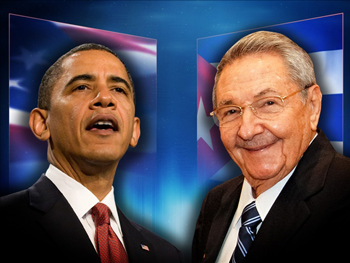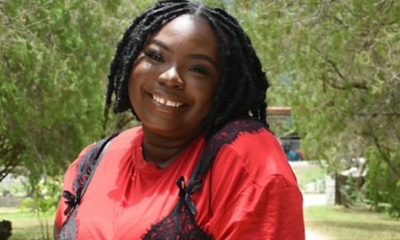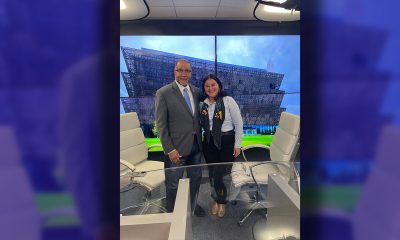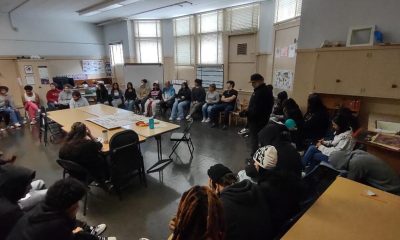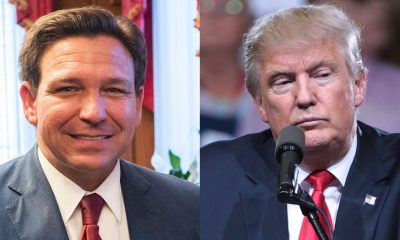World
Obama-Castro Seek a New Dialogue and a New Reality
by Askia Muhammad
Special to the NNPA from The Final Call
WASHINGTON (FinalCall.com) – President Barack Obama added another notch to his diplomatic achievements-belt April 11, meeting for more than an hour in Panama City with Cuban President Raúl Castro, the first meeting between leaders of the two countries in more than 50 years.
Mr. Obama’s historic trip began in Kingston, Jamaica where he met with that country’s Prime Minister Portia Simpson-Miller and the leaders of the Caribbean Community (CARICOM), an organization made up of 15 Caribbean governments. The U.S. and its sole ally in the region have been isolated from most of the governments of the Western Hemisphere over the harsh U.S. sanctions against Cuba. This trip however seemed to right those past wrongs.
The atmospherics could not have been better for Mr. Obama. His weekend began with a visit and a wreath laying at Jamaica’s Bob Marley Museum. That visit, the president told Ms. Simpson-Miller, was “one of the more fun meetings I have had.” She told Mr. Obama, “You’re very loved in this country,” and she expressed her “gratitude” for American support.
The United States is Jamaica’s leading trade partner, main tourism market and chief source of foreign direct investment, she said. She also cheered Mr. Obama’s push to normalize relations with Cuba, saying to him, “You are on the right side of history,” according to White House reporters traveling with the president.
“What we want to do is find out how we can be an even more constructive partner” with Jamaica, the president said. He mentioned climate change, trade, security cooperation.
What Ms. Simpson-Miller did not discuss while reporters were present were calls from authors such as Mark Weisbrot, co-director of the Center for Economic and Policy Research, who wrote that the U.S. should “put an end to extreme austerity in Jamaica.”
The next day at the meeting of the seventh convening of the Summit of the Americas, Mr. Obama told the leaders from Bolivia, Chile, Costa Rica, Cuba, Ecuador, El Salvador, Guatemala, Honduras, Mexico, Panama, Paraguay, Venezuela, and Uruguay: “I am proud to be with you at this first-ever official gathering of civil society leaders at the Summit of the Americas. And I’m pleased to have Cuba represented with us at this summit for the very first time.”
Mr. Obama emphasized his view that there is a “strong common agenda” among Western Hemisphere countries and stressed that what was good for the region is good for the United States, “not just because of proximity” but because of the “incredible bonds” between our peoples. “It is up to us to make sure the United States stands in solidarity and partnership with the countries around this table,” Mr. Obama said.
He noted criminal elements and narco-trafficking “thrives when people feel they have no other pathway to success.” Since he took office in 2009, Mr. Obama said that exports from the U.S. to Latin America and imports from Latin America to the U.S. are up 50 percent. That is “an indication not only of the recovery that was initiated by important policies that were taken, but the continuing integration that’s going to continue to be taking place in this hemisphere.”
There are four key areas on which success is to be built, Mr. Obama told the leaders: Education and worker training; Infrastructure; Broad-based economic development; and Governance. The highlight of Mr. Obama’s trip, however, was his hour-long meeting with Cuban President Castro. “This is obviously an historic meeting,” Mr. Obama said while reporters were present. The history between the United States and Cuba is complicated, he said. After 50 years of policy that had not worked “it was time for us to try something new.”
“We are now in a position to move on a path toward the future.” He said the majority of Americans and Cubans have responded positively to the policy change. Obviously there are going to be deep and significant differences between the U.S. and Cuba remaining, he continued. “Over time it is possible for us to turn the page and develop a new relationship between our two countries,” Mr. Obama said.
The immediate tasks: opening embassies in Washington and Havana. After Mr. Obama spoke, he and Mr. Castro stood and shook hands. Then Mr. Castro spoke, and after his remarks, the men stood again and shook hands.
Mr. Castro spoke Spanish. His remarks as translated through his interpreter: He said he agreed with everything Mr. Obama said. He said they can have differences “with respect of the ideas of the others. We are willing to discuss everything but we need to be patient, very patient.
“We might disagree on something today on which we could agree tomorrow,” Mr. Castro said according to reporters present. He criticized past U.S. policies, but singled out Mr. Obama from previous U.S. presidents who enforced the embargo. He even admitted he has begun reading Mr. Obama’s autobiography.
A senior administration official later briefed the U.S. press pool saying, “The two presidents discussed the ongoing embassies in Havana and Washington.” The presidents committed to opening the embassies and directed their respective teams to resolve the lingering issues as quickly as possible so the embassies can open, the official said.
The two leaders discussed the completion of the State Department review of Cuba’s designation as a sponsor of terrorism, and Mr. Obama informed Mr. Castro that the next step, the interagency review, is near or is completed and that Mr. Obama would be making a decision in the “coming days.”
Mr. Castro did not extend an invitation to Mr. Obama to visit Havana during their talks.
They did express a real commitment to do something different and chart a new course. Mr. Castro spoke of that in the meeting. “There was a sense of the moment in the room,” the senior administration official said. “There wasn’t tension.”
The U.S. had other reasons for wanting to deflect attention away from past hostilities with Cuba, according to Miguel Rinker Salas. “Well, a list that the U.S. created, and the U.S. put Cuba on it. I think it’s really a political fig leaf on the part of Obama,” Mr. Salas told “Democracy Now!”
“He wants to be able to hide behind something, come to the summit, deliver something. The reality is that the U.S., for—Cuba, for the U.S., really became an impediment. It creates its isolation in the region. The U.S. has other interests in the region.
“They would really like to have a discussion about the Trans-Pacific Partnership. They would like to have an alliance about the free trade for the Americas. They would like to promote what are really their economic interests, so that the issue of Cuba is really a vestige of the past. It is part of a Cold War legacy. It has both national implications in the U.S., but it has, more importantly, international implications.
“The U.S. is isolated on Cuba in the UN. Only two countries vote for its support of an embargo. It’s isolated in Latin America. It’s isolated in Europe, Africa, Asia. So, really, the Cuba issue has become really an impediment, a block for the U.S. in the region,” said Mr. Salas, who is professor of Latin American history at Pomona College. His new book is called Venezuela: What Everyone Needs to Know.
Activism
African Union Group to Award Rev. Dr. Amos Brown for Bringing Civil Rights Movement to Global Stage
Dr. Macaulay Kalu, secretary general of AU6RG, will present Dr. Brown with the Global Peace Builder Award. Other presenters include Rev. Dr. Freddie Haynes, senior pastor of Friendship West Baptist Church in Dallas; Oakland Mayor Barbara Lee, long-time advocate for appropriations to Africa as a congressmember; Rick Callendar, California-Hawaii president of the NAACP; Dr. Ike Neliaku, president and chairman of the Nigerian Institute of Public Relations; Pastor Ituah Ighodalo, head of the African Leadership Group and Ambassador Thompson and John William Templeton, founder of the Journal of Black Innovation National Black Business Month®.

By Carla Thomas and John William Templeton
On Aug. 31, the Third Baptist Church of San Francisco will mark its 173rd anniversary with an event steeped in history and global significance. This year’s commemoration, themed “Achieving Dr. King’s Promised Land Together,” will honor the lifelong achievements of Dr. Amos C. Brown, Sr.— a towering figure in the Civil Rights Movement — on a day that also observes the International Day for People of African Descent.
Brown will be recognized by the African Union’s organ for Africans abroad for ‘planetizing’ the civil rights movement gains at San Francisco’s Third Baptist Church, 1399 McAllister St., at 3 p.m.
The African Union, made up of 54 countries on the African continent, consists of five regions. It created a sixth region, the African Union Sixth Region Global (AU6RG), for the 400 million Africans living abroad. On Sept. 7, the second AU-Caribbean Community Summit occurs in Addis Ababa, Ethiopia.
Dr. Macaulay Kalu, secretary general of AU6RG, will present Dr. Brown with the Global Peace Builder Award. Other presenters include Rev. Dr. Freddie Haynes, senior pastor of Friendship West Baptist Church in Dallas; Oakland Mayor Barbara Lee, long-time advocate for appropriations to Africa as a congressmember; Rick Callendar, California-Hawaii president of the NAACP; Dr. Ike Neliaku, president and chairman of the Nigerian Institute of Public Relations; Pastor Ituah Ighodalo, head of the African Leadership Group and Ambassador Thompson and John William Templeton, founder of the Journal of Black Innovation National Black Business Month®.
Held during the 173rd anniversary of the church, the event called “Africa-America: Achieving Dr. King’s Promised Land Together” is a Diaspora-wide discussion led by Dr. Brown on what Martin Luther King, Jr. would say today.
Galvanized by the horrific 1955 slaying of Emmett Till, Dr. Brown’s journey in activism began in Jackson, Mississippi, where a neighbor, Medgar Evers, the NAACP’s first field secretary in that state, encouraged Brown to found the Mississippi NAACP Youth Council.
In 1956, Evers personally drove Brown to the NAACP convention in San Francisco, where Brown would first hear Dr. Martin Luther King Jr. speak. Brown became a prominent Freedom Rider, later attending Morehouse College and taking the only class Dr. King ever taught there. Thirteen years after Evers was assassinated in Jackson, Brown arrived at Third Baptist Church in 1976, serving with distinction for 49 years before his recent retirement. Under his stewardship, the church solidified its commitment to social justice and international unity.
His Excellency Rev. Ladi Peter Thompson, deputy secretary general for peace and security of AU6RG, said, “As a mentee of Medgar Evers, Freedom Rider and student of Dr. Martin Luther King Jr., Dr. Brown is the perfect authority for the young people of the Diaspora on achieving the prophetic goal that Dr. King foresaw in Memphis.”
Lady Dentaa Amoateng, founder of Grow, Unite, Build Africa (GUBA), will also announce that Dr. Brown is an honoree at the GUBA Award in Bridgetown, Barbados in November. The popular actress in Ghana and the United Kingdom will attend in person.
Dr. Lezli Baskerville, president/counsel of the National Association for Equal Opportunity in Higher Education, which includes 105 Historically Black Colleges and Universities (HBCUs) and 90 predominantly Black institutions (PBIs), invites its students, faculty, and alumni to attend or join remotely.
“HBCUs produced both Dr. King and Dr. Kwame Nkrumah and are the fountainhead for Diaspora unity,” said Baskerville.
Templeton, author of “ReUNION: State of Black Business, 22d edition,” said “Our movement will advocate the continuance of tariff-free treatment for Africa and the Caribbean; respect for African-American and African elected officials and the 13th, 14th, and 15th Amendments and the strengthening of educational and research connections across the Diaspora.”
Templeton said Black institutions have been at the forefront of defining the image of 1.5 billion Black people globally, a mission that is even more important as African youth will be the majority of the world’s young people in the coming decades.
ABOUT THIRD BAPTIST CHURCH
Founded on West Indian Emancipation Day on Aug.1, 1852, Third Baptist said in its annual report in 1858 that its sole purpose was the elimination of American chattel slavery and took an active role among the California abolitionists who convinced President Abraham Lincoln to issue the Emancipation Proclamation. The current sanctuary is constructed with wood from the Goodall Mansion, where President U.S. Grant stayed after leaving the White House, and is the last place where Dr. W.E.B. DuBois spoke before leaving for Africa in 1958.
Activism
Newsom, Pelosi Welcome Election of First American Pope; Call for Unity and Compassion
“In his first address, he reminded us that God loves each and every person,” said Newsom. “We trust that he will shepherd us through the best of the Church’s teachings: to respect human dignity, care for the poor, and wish for the common good of us all.” Newsom also expressed hope that the pontiff’s leadership would serve as a unifying force in a time of global instability.
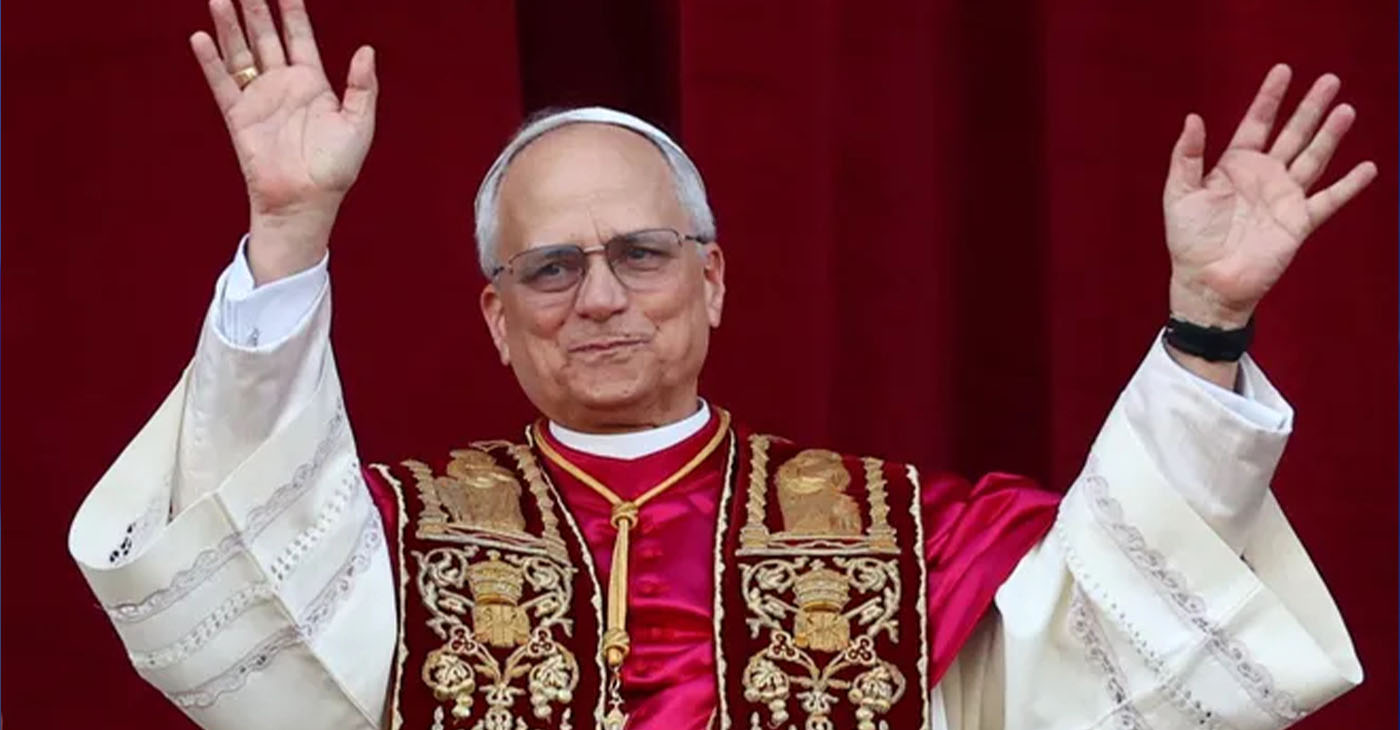
By Bo Tefu, California Black Media
Gov. Gavin Newsom and First Partner Jennifer Siebel Newsom on May 8 issued a statement congratulating Pope Leo XIV on his historic election as the first American to lead the Catholic Church.
The announcement has drawn widespread reaction from U.S. leaders, including former House Speaker Nancy Pelosi, who called the moment spiritually significant and aligned with the values of service and social justice.
In their statement, the Newsoms expressed hope that the newly elected pope would guide the Church with a focus on compassion, dignity, and care for the most vulnerable. Newsom said he and the First Partner joined others around the world in celebrating the milestone and were encouraged by the pope’s first message.
“In his first address, he reminded us that God loves each and every person,” said Newsom. “We trust that he will shepherd us through the best of the Church’s teachings: to respect human dignity, care for the poor, and wish for the common good of us all.”
Newsom also expressed hope that the pontiff’s leadership would serve as a unifying force in a time of global instability.
“May he remind us that our better angels are not far away — they’re always within us, waiting to be heard,” he said.
Pelosi, a devout Catholic, also welcomed the pope’s election and noted his symbolic connection to earlier church leaders who championed workers’ rights and social equality.
“It is heartening that His Holiness continued the blessing that Pope Francis gave on Easter Sunday: ‘God loves everyone. Evil will not prevail,’” said Pelosi.
Activism
Retired Bay Area Journalist Finds Success in Paris with Black History Tours
In the late 90s, Stevenson finally realized her dream of living in Paris, now with her daughter. She started exploring the history of Africans in the city and would go on to teach others the same. Her business, which she named Black Paris Tours (BPT), received a significant boost when a family friend gave her a stack of cash and encouraged her to expand on the knowledge that she had only started to share with people she knew.

By Post Staff
There were two things Oakland-born, East Palo Alto-raised Ricki Stevenson always dreamed of:
- Going to New York as a newscaster to tell the true story of Blacks in America.
- Living and working in Paris one day.
Her dreams of life in Paris began when she was three years old and her mother, a former professional dancer, took her to see Josephine Baker perform. She was 11 when her parents took her to the Stanford University campus to meet James Baldwin, who was speaking about his book, “The Fire Next Time.” Ricki says that’s when she knew she’d one day live in Paris, “the city of light!”
But before that would ever happen, she had a tumultuous career as a newscaster across the country that was inspired by her family’s history.
Stevenson recalls marching with Cesar Chavez as he fought for labor rights for farm workers in California.
“Are we Mexican too?” she asked her parents. “No, but we will fight for everyone’s human rights,” they responded to her.
Ironically, Ricki’s paternal family roots went back to Greenwood, Oklahoma, infamous for the 1921 bombing of Black Wall Street. A time when Black people had oil wells, banks, and a thriving business community.
This background would propel her into a 25-year journalism career that gave her the opportunity to interview greats like President Jimmy Carter, PLO leader Yassir Arafat, James Baldwin, Rev. Jesse Jackson, UN Ambassador Andrew Young, Miriam Makeba, and the leaders of South African liberation movements.
A job offer from KCBS radio brought her back to the Bay Area in the 1980s. Then came the switch to TV when she was hired as a Silicon Valley business reporter with KSTS TV, working at the first Black-owned television station in northern CA (created and owned by John Douglas). Along the way, Stevenson worked as an entertainment reporter with BET; coproduced, with her disc jockey brother Isaac, a Bay Area show called “Magic Number Video;” lived in Saudi Arabia; worked as an international travel reporter with News Travel Network; and worked at KRON TV a news anchor and talk show host.
In 1997, Stevenson realized her dream of living in Paris with her young daughter, Dedie. She started exploring the history of Africans in the city and would go on to teach others the same. Her business, which she named Black Paris Tours (BPT), received a significant boost when a family friend, Admiral Robert Toney put a chunk of money in her hand. He said, “Ricki, my wife and I have been coming to Paris for 20 years, but in just two days with you and Dedie, we’ve learned and seen more than we ever did before.”
Years after BPT took off, Ricki met Nawo Carol Crawford and Miguel Overton Guerra, who she recruited as senior scholar guides for Black Paris Tours.
Guerra says he is proud of his work with Black Paris Tours in that it provides a wealth of information about the rich legacy of African and African American history and influence in Paris and Europe.
“I tend to have a feeling for history always being a means of a reference point backwards … you start to understand the history, that it isn’t just the United States, that it began with African people,” Guerra says.
He said that it’s been a pleasure to watch people learn something they didn’t know before and to take them through the city to key points in Black history, like hangout spots for writers like Baldwin and Richard Wright, restaurants in the busiest parts of Paris, the home of Josephine Baker and so much more.
Although the tours are open to all, Guerra hopes that those of African descent from all over the world can embrace that they don’t have to just stay where they are because movies and media have portrayed cities like Paris to be only white, it’s multicultural and accepting to all.
“We’ve been here, and we’ve been there, going way back when. And we shouldn’t be considered or consider ourselves to be strangers in any place that we go to,” he said.
Stevenson notes they’ve had 150,000 people take their tour over the years, with notables like former NFL quarterback Colin Kaepernick, Smokey Robinson, Steve Harvey, Miriam Makeba, and more.
Friends and former media colleagues of Stevenson compliment the BPT crew on their knowledge of the city and their ability to always keep it interesting.
“He [Guerra] just had a deep, deep wealth of knowledge and he was constantly supplanting information with historical facts and the like. I love that it was demonstrating and showing how Black people have thrived in Paris or contributed to the culture in Paris,” Candice Francis said.
She toured in the summer of 2022 and stated that in the two weeks that they visited Paris, BPT was the highlight of her trip. She shared that she was proud of Stevenson and the life she’d managed to manifest and build for herself.
“Even if you’re visiting Paris for the tenth time, if you haven’t taken the tour, then by all means, take it,” Francis emphasized.
Magaly Muñoz, Gay Plair and Paul Cobb also contributed to this story. You can book your own adventure with Black Paris Tours at www.blackparistour.com.
-

 Activism3 weeks ago
Activism3 weeks agoOakland Post: Week of November 12 – 18, 2025
-

 Activism3 weeks ago
Activism3 weeks agoIN MEMORIAM: William ‘Bill’ Patterson, 94
-

 Activism3 weeks ago
Activism3 weeks agoHow Charles R. Drew University Navigated More Than $20 Million in Fed Cuts – Still Prioritizing Students and Community Health
-

 Bay Area3 weeks ago
Bay Area3 weeks agoNo Justice in the Justice System
-

 #NNPA BlackPress3 weeks ago
#NNPA BlackPress3 weeks agoLewis Hamilton set to start LAST in Saturday Night’s Las Vegas Grand Prix
-

 #NNPA BlackPress3 weeks ago
#NNPA BlackPress3 weeks agoThe Perfumed Hand of Hypocrisy: Trump Hosted Former Terror Suspect While America Condemns a Muslim Mayor
-

 #NNPA BlackPress2 weeks ago
#NNPA BlackPress2 weeks agoBeyoncé and Jay-Z make rare public appearance with Lewis Hamilton at Las Vegas Grand Prix
-

 #NNPA BlackPress3 weeks ago
#NNPA BlackPress3 weeks agoTrump’s Death Threat Rhetoric Sends Nation into Crisis

